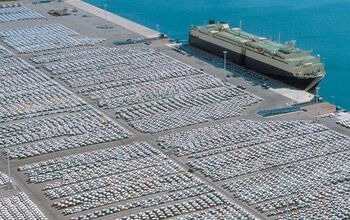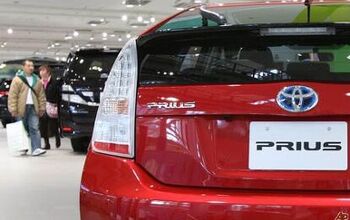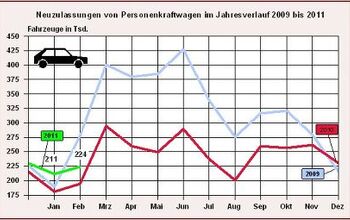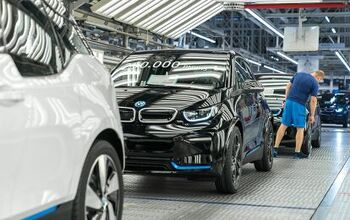China In February: Up 46 Percent

Chinese bought 46 percent more cars this February than in February 2009. This according to official data by the China Association of Auto Manufactures (CAAM), as reported by China’s state news agency Xinhua.
The avid TTAC reader is not surprised. A week ago, we predicted numbers along these lines, simply by looking at GM China’s February sales report. Amongst observers of the Chinese market, GM sales (all of them, including Wuling) have turned into a reliable leading indicator. A dubious honor: GM China usually is only a few percent ahead of the market, which doesn’t translate into a rapid gain of market share. This month is not much different: GM China’s February sales rose 51 percent from a year earlier, only 5 percent ahead of the market.
Aficionados of the Chinese bubble theory are now on their feet, shouting “I told you so!” Sales in January had shot up by 115.5 percent. In February, the growth was less than half. Obviously, the bubble must be bursting. No so fast.
One needs to study the oddities of the Chinese calendar before jumping to conclusions. Sit down while I explain. There is something called “Chinese New Year.” Think of it as if Thanksgiving, Christmas, Valentine’s Day and Fourth of July would all fall in the same month. China is pretty much shut down for that month. (There was a reason why I reported from Tokyo for most of February.) Sales shoot up before the holidays. And then everything comes to a halt. The Chinese don’t have the sophistication of adjusting a SAAR to selling days, they just know their calendar: Last year, Chinese New Year was in January, this year, it was in February. So numbers must be seen in aggregate.
Says Xinhua: “The combined auto sales in January and February surged 84 percent from a year earlier to 2.9 million units.” Now, that’s a healthy number for two months.
All eyes are on the following months. Last year, Chinese auto sales were amongst the first to shake off carmageddon. They started to grow in earnest in March 2009. By the end of 2009, sales had risen 45 percent to 13.6 million units, according to CAAM, and China was officially the world’s largest car market and car producer. Compared to these strong months (sales in November and December 2009 rose more than 90 percent,) any further monthly growth will look small. But even if China grows at a (for China) moderate rate of 20 percent, this would translate into more than 16m units by the end of 2010.
No report of Chinese sales numbers can be complete without a reference to China’s governmental sales incentives. Compared to the money that had and is been thrown around in other countries, the Chinese incentives were rather benign. The sales tax for cars below 1.6 liters was halved from 10 percent to 5 percent. Big deal: A new QQ goes for as little as $4.100. So instead of paying $410 in tax, the tax was $205. Also, it is often forgotten (or intentionally omitted) that the tax for bigger bore vehicles was doubled from 10 percent to 20 percent – which didn’t seem to subdue China’s appetite for Mercedes-Benz or BMW. This year, the tax for sub 1.6 liter cars did go up to 7.5 percent – again with no effect.
If you want to collect the mother of all subsidies in China, then wait for the impending announcement of a governmental contribution of up to 60,000 yuan (US$8,797) towards the purchase of a “new energy” vehicle. Shanghai Daily reports that “China wants to have 500,000 green cars rolling on the streets within three years while improving infrastructure, such as recharging stations, for these vehicles.” Li Yizhong, Minister of Industry And Information Technology, said that “Without government support, it would be difficult for Chinese families to buy new energy vehicles.” Not necessarily difficult, but the price premium of a hybrid over a regular car is around 50 percent, and that’s too much to stomach for a Chinese who likes a good deal.

Bertel Schmitt comes back to journalism after taking a 35 year break in advertising and marketing. He ran and owned advertising agencies in Duesseldorf, Germany, and New York City. Volkswagen A.G. was Bertel's most important corporate account. Schmitt's advertising and marketing career touched many corners of the industry with a special focus on automotive products and services. Since 2004, he lives in Japan and China with his wife <a href="http://www.tomokoandbertel.com"> Tomoko </a>. Bertel Schmitt is a founding board member of the <a href="http://www.offshoresuperseries.com"> Offshore Super Series </a>, an American offshore powerboat racing organization. He is co-owner of the racing team Typhoon.
More by Bertel Schmitt
Latest Car Reviews
Read moreLatest Product Reviews
Read moreRecent Comments
- Jkross22 When I think about products that I buy that are of the highest quality or are of great value, I have no idea if they are made as a whole or in parts by unionized employees. As a customer, that's really all I care about. When I think about services I receive from unionized and non-unionized employees, it varies from C- to F levels of service. Will unionizing make the cars better or worse?
- Namesakeone I think it's the age old conundrum: Every company (or industry) wants every other one to pay its workers well; well-paid workers make great customers. But nobody wants to pay their own workers well; that would eat into profits. So instead of what Henry Ford (the first) did over a century ago, we will have a lot of companies copying Nike in the 1980s: third-world employees (with a few highly-paid celebrity athlete endorsers) selling overpriced products to upper-middle-class Americans (with a few urban street youths willing to literally kill for that product), until there are no more upper-middle-class Americans left.
- ToolGuy I was challenged by Tim's incisive opinion, but thankfully Jeff's multiple vanilla truisms have set me straight. Or something. 😉
- ChristianWimmer The body kit modifications ruined it for me.
- ToolGuy "I have my stance -- I won't prejudice the commentariat by sharing it."• Like Tim, I have my opinion and it is perfect and above reproach (as long as I keep it to myself). I would hate to share it with the world and risk having someone critique it. LOL.


































Comments
Join the conversation
I understand the male need for frail, powerless women --quite well-- but she is a missed meal away from hospitalization.
I'll protect her! (and give her a cheeseburger as well).